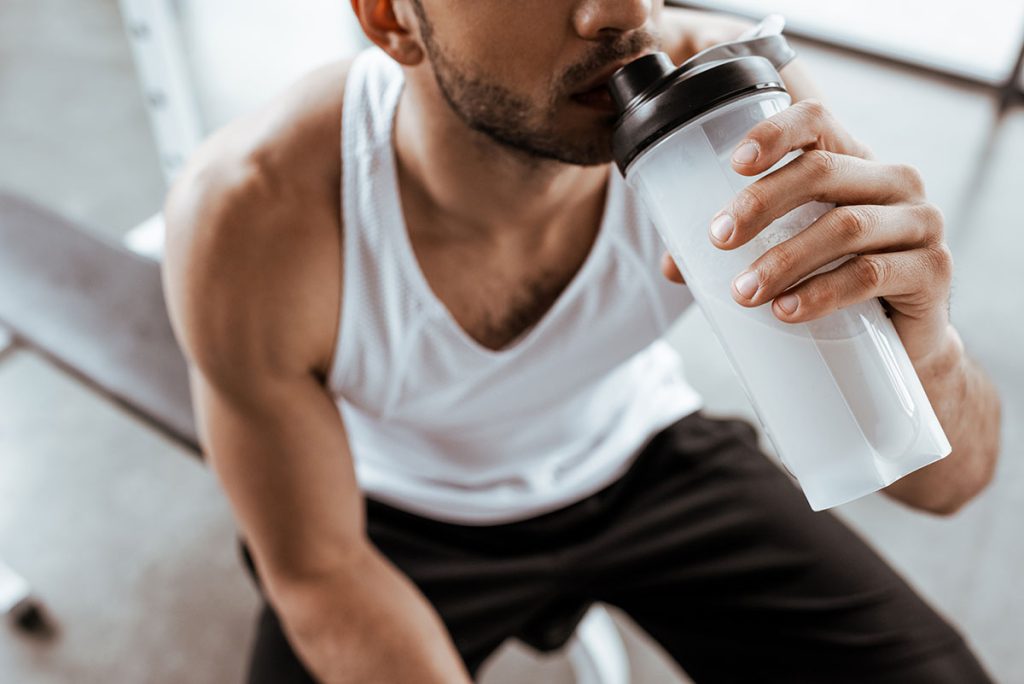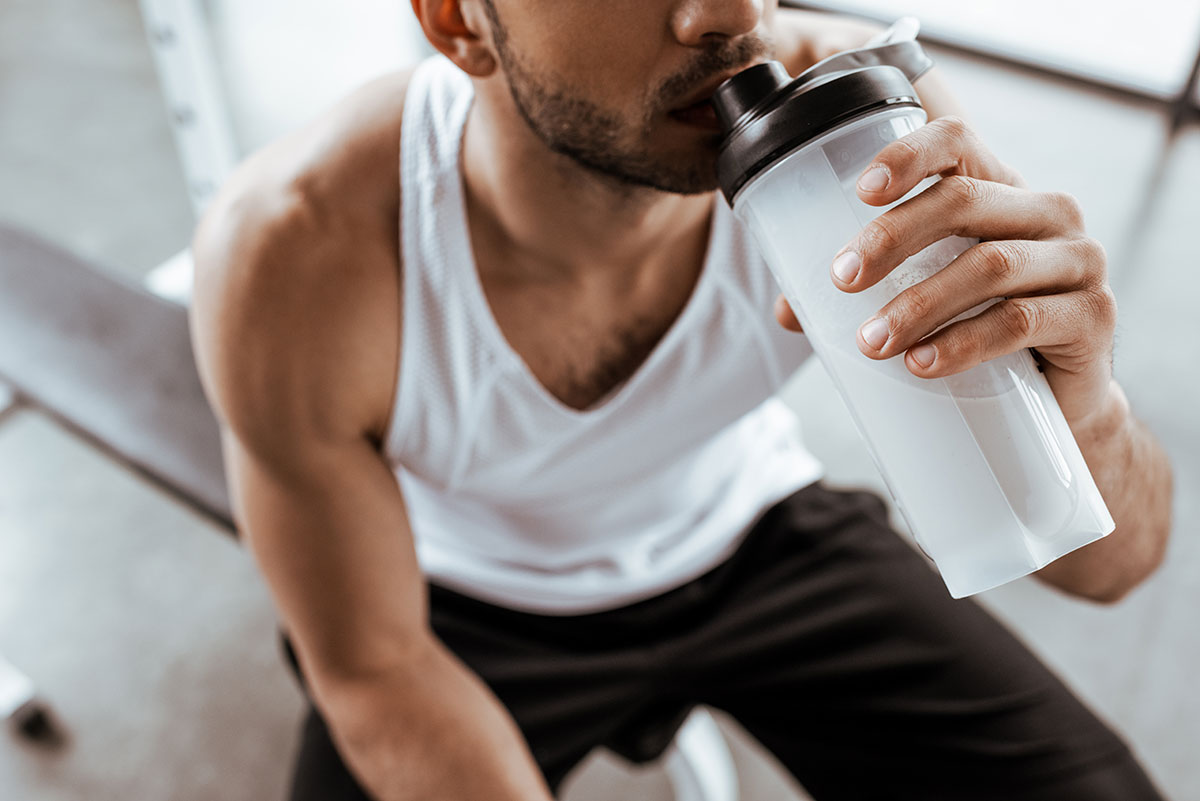Commercial Sports Foods: A Matter of Preference
“I thought I was supposed to use gels during long runs. Can candy work just as well..?”
“Are electrolyte tablets the best way to replace sodium loses from sweaty workouts?”
“I get diarrhea when I use some commercial sports foods…help!”

If you are among the many athletes who have no idea which commercial sports foods are best to support your workouts, welcome to the club! Advertisements have led many active people—from serious competitors to anyone who breaks a sweat—to believe that pre-workout drinks, energy gels, and electrolyte replacers (among the many other commercial sports foods) are a necessary part of a sports diet. Guess what? Real foods can often work just as well.
While there is a time and a place for commercial sports foods, many athletes needlessly spend lots of money on them. The purpose of this article is to help you become an informed consumer, so you know what these products are (convenient, expensive)—and what they are not (essential for all exercisers). Whatever you do, test them during training, so you can learn if they settle well in your gut. You don’t want surprises during competitions!
Pre-Workout Supplements
When you feel low on energy and are dreading your afternoon training session, pre-workout products that promise explosive energy, sharp focus, and incredible results can be very tempting to buy. While simply eating a heartier breakfast, lunch, and pre-exercise snack can help prevent an afternoon droop, many athletes fail to appreciate the power of food. Instead, they look for “magic.”
- The “magic” ingredient in most pre-workout products is caffeine. You could just as easily get stimulated with coffee or NoDoz. True energy comes with eating a pre-exercise banana, granola bar, or carb-based snack.
- The best pre-workout snacks digest easily and don’t talk back to you. Standard supermarket foods (e.g., toast, oatmeal, animal crackers, dried pineapple, dates, banana, even a swig of maple syrup) are likely more familiar to your gut (less likely to cause intestinal upset) than unfamiliar commercial sport fuels.
- Some pre-workout products tout they are sugar free, as if sugar is evil for athletes. Sugar (carbohydrate) is a true energizer in comparison to caffeine, which is just a stimulant. Carbs + caffeine will offer a better workout (for those who tolerate caffeine, that is)!
- Some pre-workout products contain creatine, vitamins, beta-alanine, and/or other stuff that looks good on the label. The dose may be inadequate to make a significant difference in your performance. Do your homework to learn what is an effective dose.
- Buyer beware, pre-workout products are poorly regulated. Who knows what the products contain. Claims that sound too good to be true should raise an eyebrow. Be sure your choice says NSF Certified for Sport or Informed Sport on the label.
Gels
During hard exercise lasting 1 to 2.5 hours, you’ll perform better if you consume ~30 to 60 grams (120-240 calories) carbohydrate per hour. Take your choice of gel, sport drink, or gummi bears!
- During extended exercise lasting more than 2.5 hours (ultra-marathon, long bike ride), you want to target 60 to 90 g carb/h (240-360 calories), depending on the intensity of your exercise, your body size, sport, and intestinal tolerance.
- Most gels offer 100 calories (25 g carb) in the form of some type of sugar, such as maltodextrin, sucrose, fructose, or glucose. The Nutrition Facts on the gel’s label can you help determine the right amount to consume.
- Many athletes love the convenience of gels because they come in a good portion-size and are easy to carry. Others dislike them due to their consistency. For some athletes, gels digest poorly because they contain a type of sugar that can trigger bloat, diarrhea, and undesired pit stops. Always experiment with new gels during training!!!
- Some popular alternatives to the 100 calories of carb (sugar) in a gel include gummy bears, Twizzlers, Swedish fish, gum drops, peppermint patties, maple sugar candy, even chocolate (though it melts in hot weather). The trick with choosing “real food” is to figure out how to carry it. Pockets help.
Electrolyte tablets
Electrolytes (electrically charged particles, most often known as sodium, calcium, magnesium, and potassium), are minerals abundant in food.
- For sweaty athletes, sodium (a part of salt) is the main electrolyte of concern. Salty foods enhance fluid retention and help keep you better hydrated than plain water, which goes in one end and out the other.
- Many electrolyte replacers are lower in sodium than you may think. By reading food labels, you’ll discover a slice of bread can have more sodium than 8-ounces of Gatorade.
- Athletes who sweat heavily might lose about 500 to 1,000 mg sodium in an hour of vigorous exercise. Some options for replacing these sodium losses include:
| Commercial Sports Food | Sodium (mg) | Salty food | Sodium (mg) |
| Propel Electrolyte water, 8 oz
|
105 | String cheese, 1 stick | 220 |
| Gatorade, 8 oz
|
110 | Beef Jerky, 1 oz | 600 |
| Gu Salted Caramel, 1 gel | 125 | Salt sprinkled on food, ¼ tsp | 600 |
| Nuun, 8 oz
|
175 | Broth, from 1 cube Herb-ox | 1,100 |
- Replacing sodium is most important for athletes who sweat heavily for extended periods in the heat. Yet, these athletes generally consume foods that contain sodium before, during and after exercise. For example, football players who refuel from morning practice with a high-sodium ham and cheese sandwich with mustard and dill pickles can bypass the Gatorade at lunch.
- Consuming 500 mg. sodium before you exercise helps retain fluid, delay dehydration, and enhance endurance. Sprinkle salt on that pre-exercise omelet, pasta, or sweet potato before you exercise in the heat!
The Bottom Line
While commercial sports foods have their time and place for intense exercisers, not every athlete needs to pay the price for pre-wrapped convenience.
Nancy Clark MS RD CSSD counsels both fitness exercisers and competitive athletes in the Boston-area (Newton; 617-795-1875). Her best-selling Sports Nutrition Guidebook is a popular resource, as is her online workshop. Visit NancyClarkRD.com for more info.

